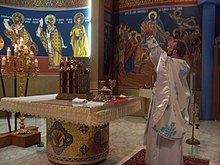Christian worship
[2] Throughout most of Christianity's history, corporate Christian worship has been liturgical, characterized by prayers and hymns, with texts rooted in, or closely related to, the Bible (Scripture), particularly the Psalter, and centered on the altar (or table) and the Eucharist; this form of sacramental and ceremonial worship is still practiced by the Catholic, Eastern Orthodox, Lutheran and Anglican churches, and Methodism to a lesser extent.
A great deal of emphasis was placed on the forms of worship, as they were seen in terms of the Latin phrase lex orandi, lex credendi ("the rule of prayer is the rule of belief")—that is, the specifics of one's worship express, teach, and govern the doctrinal beliefs of the community.
Martin Luther, a music lover, composed hymns that are still sung today, and expected congregations to be active participants in the service, singing along.
[citation needed] John Calvin, in Geneva, argued that while instrumental music had its time with the Levites of the Old Testament, it was no longer a proper expression for the church.
Furthermore, in the Genevan and Scottish Reformed tradition, man-made hymns are not sung, being seen inferior to the God-inspired psalms of the Bible.
Three broad groupings can be identified, and whilst some elements are universal, style and content varies greatly due to the history and differing emphases of the various branches of Christianity.
Worship (variously known as the Mass, Divine Liturgy, Divine Service, Eucharist, or Communion) is formal and centres on the offering of thanks and praise for the death and resurrection of Christ over the people's offerings of bread and wine, breaking the bread, and the receiving of the Eucharist, seen as the body and blood of Jesus Christ.
In the theology of the Catholic Church, the Mass takes on another dimension, that of a sacrifice which involves a ritualistic re-presentation of the Body and Blood of Christ to God the Father.
Worship in such a context also generally features spoken prayer (either unscripted or prepared), Scripture readings, congregational singing of hymns, and a sermon.
The Lord's Supper, or Communion, is celebrated less frequently (intervals vary from once a week to annually according to the denomination or local church).
[15] It is frequently played on a range of instruments that would not have previously been used in churches such as guitars (including electric) and drum kits.





